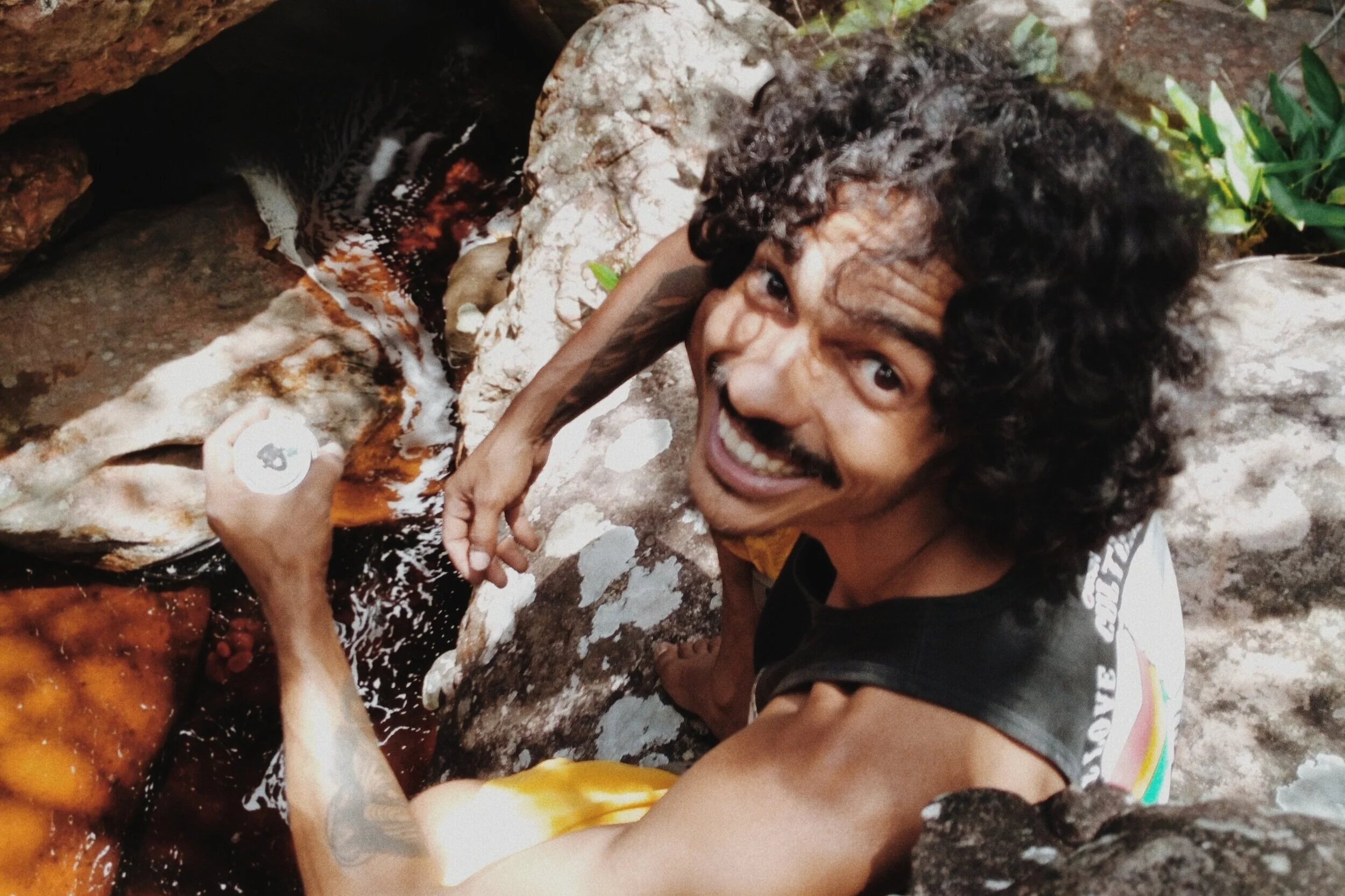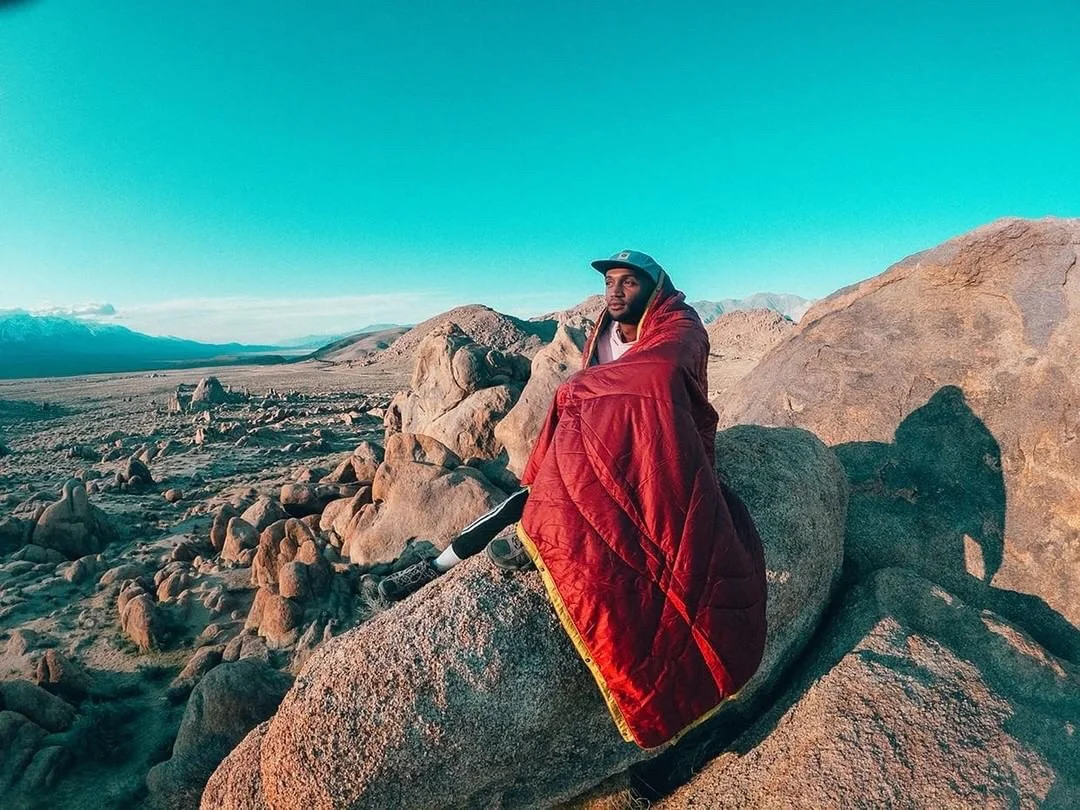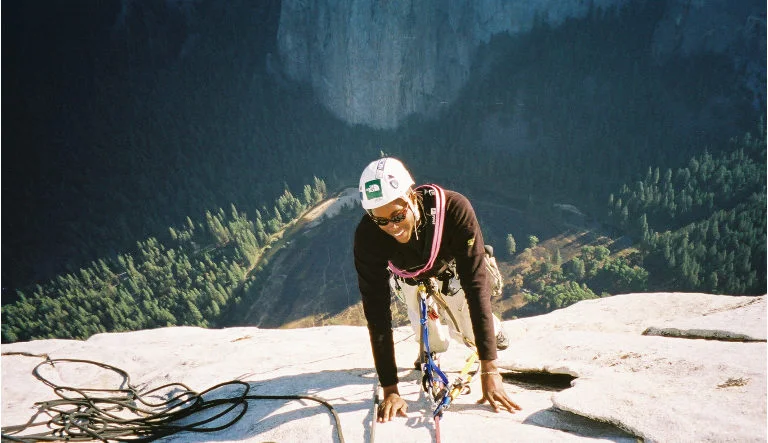Stop Making Movies About White Guys Doing Cool Shit: The Sequel
Filipina climber, Iris Diligencia, on Wheezer 5.12a / Clear Creek, CO. Photo by TandemStock
It was a Saturday and my friends and I had plans to watch Rotpunkt together. The short film, which is available on YouTube, is about German athlete Alex Megos’ journey to free climbing—without the use of aides—the hardest grade in the world. In short, another film about a chiseled white demigod performing daring feats on the rock while his friends and coaches exclaim that “he is a machine,” and “free climbing sets you free.” We, the audience, listen to Alex’s coach elaborate on the many reasons why this young man is the future of climbing. Then, to balance it out, there are a lot of close-ups of Megos performing advanced asanas on a yoga mat in board shorts. Sounds about right.
Climbing films are still focusing largely on skill-level and elite grades, which means they are showcasing the same, relatively privileged cohort of mostly white men who can afford both professional coaching and the opportunity to travel and climb for “200 days out of the year.” The shared language is that of power, strength and achievement mixed with a dash of counterculture. The pseudo-spirituality of these films is intended to add meaning while, in reality, pumping out more of the same hyper masculine sport culture.
Within this genre of ‘white man vs wild’ documentary films, there’s the often used line that the subject is “pushing the limits of human capability.” This is what white men say when they need an excuse to flex the utmost privilege. Human capability is a misnomer when, in fact, their capability hasn’t actually been challenged in any real way; when they have the means to condition themselves for the single-minded pursuit of an irrelevant task that adds no value to the world, that saves no one, that does nothing to address actual problems. And we, the audience watch to see if, with every possible resource and assurance they are able to complete the task. Spoiler alert, they usually do. Which begs the question, if Megos wasn’t climbing the hardest grade would anyone care?
Photo by iStock
The unbroken chain of ‘white guy conquers really big rock’ films dates back decades, creating an uncontested lineage of white men who get to define climbing culture at the expense of the rest of us. If we take a moment to look past the majestic drone footage and demand the whole story behind the elevated performance of someone like Megos, we begin to understand why the climbing industry prioritizes certain groups while neglecting others.
We must expect more from filmmakers: both as artists and community members. These films are examples of what not to normalize since they refuse to tell the whole story. The world is changing and rapidly diversifying even if these storylines are not. I think it’s reasonable to ask for new films with minimum levels of understanding of race, class, power, privilege and social justice. Hold off on making that movie until you know more about how power and privilege function. Hold off because these films are more than simply derivative and uninspiring—they cause actual harm.
“Is it cool to watch you stick your fingers in mono pockets and do pull-ups on big walls? Sure. But not if it means folks get to pretend that it’s enough without any deeper sense of responsibility to our communities at large. ”
You know folks are coming for this article in defense of Alex Megos and other industry powerhouses, so here’s a disclaimer: yes, Alex works hard and he’s very talented and seems like an all-around nice person. This isn’t about any of that. This is about moving forward together in a way that doesn’t prioritize damaging narratives over healing—which ultimately means share the mic or, better yet, pass it.
Photo by scotto72/iStock / Getty Images
Why can’t these films coexist alongside conversations about how to make climbing more inclusive? Well, because when white men make noise, it drowns out basically everything else. They have the best equipment, the biggest budgets, the most sponsors and storylines to keep us all thinking about anything but the fact that white men literally do the worst shit to the world and benefit the most from the status quo. Something’s wrong.
Movies like Rotpunkt and even United States of Joe’s, included in this year’s Reel Rock film series, regurgitate cinematic dogmas that damage efforts to heal our communities. US of J’s, basically hinges on the fact that a group of white people in a rural area and a group of white people from the city finally realize that by working together they can find common ground and resolve their conflict. That way, the townspeople don’t feel like they’re being invaded by no good punks and the climbers don’t lose access to climbing areas (heaven forbid). Good. Thanks for joining the rest of us over here where community-mindedness has been the modus operandi for millennia. What else does the film offer audiences? The exact same cisgender, white male history lesson positing climbing as “counter-culture.”
Photo courtesy of iStock
The idea that white male climbers have in their head of climbing as “counter-culture” begs the question: counter to what? The fact that you opted out of your traditional career paths in society isn’t anything revolutionary. And it doesn’t mean that you were oppressed. Don’t appropriate punk. White guys invaded the natural landscape to enjoy themselves and compete, and they’re doing what white men always do, which is to take up the most space and preserve their racial dominance through homogenized stories—all while pretending that climbing films are about “human capability.” Please don’t mistake privilege for counter-culture.
In Rotpunkt, there is a moment where Alex Megos throws out a really intense quote as he is struggling to conquer his climb: “there are no bad conditions, there is only weakness.” Cool, man. If that’s what’s getting you through your days. But try sticking with that as a core belief system while acknowledging you have the utmost privilege as a cis-white male to buy into that bullshit without ever really facing bad conditions like the ones imposed by poverty, racism or homophobia. A lot of folks can come for this article because everyone feels like they’ve struggled. That’s also not the point. The point is to center a group effort to move our societies into healing—and these films not only neglect those efforts, but actively harm them by refusing to acknowledge the world beyond the one that is most real to white folks.
Photo by SolStock/iStock / Getty Images
What is fundamental, and would shift the narrative entirely, would be to accept and honour art as inherently political. This is not original thinking on my part, James Baldwin and Chinua Achebe had this conversation right about forty years ago. Rotpunkt is oppressive. United States of Joe’s is oppressive. Any film that is released for consumption that abides by the status quo and makes no attempt to be self-aware is oppressive.
Sorry Alex Megos, because you do seem nice, but you don’t get your own film in 2019 where you get to climb and be the best while the rest of us over here are doing the work to dismantle the cis-hetero white male patriarchal nightmare that would otherwise consume us, as it has our loved ones for generations piled on generations. Is it cool to watch you stick your fingers in mono pockets and do pull-ups on big walls? Sure. But not if it means folks get to pretend that it’s enough without any deeper sense of responsibility to our communities at large. Which is exactly what ends up happening.
Why do these films insist on reproducing the same story lines? Because they are beholden to a white audience which doesn’t quite believe that other storylines—featuring different races, genders, abilities, grades—exist, much less deserve to be seen or heard. White people, catch up. Not just in ways that pay lip service to all the effort being made around you without your active participation. The least you can do is educate yourselves and stop settling for this vapid, recycled narrative.
Imagine what it would look like if we could rewrite the outdoor industry’s magazines to focus more on content that was intentionally—maybe a little messy, at first—geared toward social change. If a reader happened to be curious about who is climbing the hardest grades they could flip through to page 16 and refer to a side column that would list Megos at the top. Great. Now we know. And you might still advertise your techwear and gear. The rest of the pages? Dedicated to rewriting colonial narratives.
Rewrite this ridiculous history of climbing that showcases shirtless white men from decades ago in film after depressing film. What about the land? What about indigenous histories? Why are there only men in these shots? At least speak to it, so that it isn’t internalized by the young black and brown girls in the audience. And if no one on your team has the language for it, that’s because your team is 0/10 diverse. Start there and give those people real power to make decisions.
Remember when Alex Honnold equated his girlfriend to a lamp and negated her identity as a climber based on her grade in Free Solo? These films are a toxic, hyper-masculine, intergenerational circle jerk. Some moments are blatant and easier to call-out and some are so insidious—and those really break your heart.
Confidence and privilege go together like Megos and yellow carrots, which they did take time to highlight in the film: he loves carrots.
Photo by Tommy Lisbin on Unsplash
Watching Alex Megos climb is not boring. But I refuse to care anymore. These films take up way too much airtime. And a million people will have a million things to say, but don’t deny that the “most anticipated” outdoor films still centre white men. Don’t deny that it’s convenient for them not to mention any key words that would tell audiences they’ve actually given thought towards power and privilege in our culture.
Incidentally, the things that actually comprise our realities and affect us in our daily lives do not include Alex Megos’ god-given talent and training regimen. Nope. There are other reasons that the kid from Germany “is the best”. And those reasons are devastating. So if these movies are doing it for you, I challenge you to ask yourself how in the hell aren’t you angry or at least thoughtful regarding these topics? I don’t mind letting people know I’m upset. Anger is healthy. Expressing it is healthy. I refuse to internalize the messages from these films so that I can continue to show up for my communities.
I’ll leave you with this quote from the brilliant and masterful Chinua Achebe:
“Those who tell you “Do not put too much politics in your art” are not being honest. If you look very carefully you will see that they are the same people who are quite happy with the situation as it is.
And what they are saying is not don’t introduce politics. What they are saying is don’t upset the system. They are just as political as any of us. It’s only that they are on the other side.”
Anaheed Saatchi is a writer, queer feminist and Iranian thinker. You can read more of her work at anaheedsaatchi.com and follow her on Instagram. This article is a follow-up to Stop Making Movies About White Guys Doing Cool Shit which was published in April 2019.

















As knowledge of the outdoors tends to be handed down generationally, this broken chain has denied today’s black youth the tools they need to be able to tackle the outdoors with any degree of confidence […] we have effectively become an urbanised people.